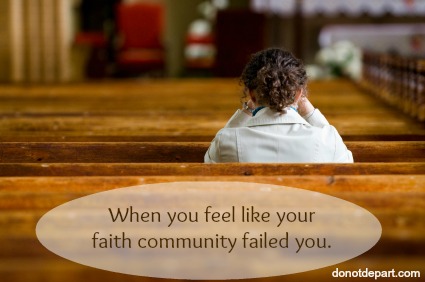Months after our son was diagnosed with autism, I sat at lunch with two friends and cried about all we were going through. They listened, they prayed for me, and they asked loving questions like, “How is this affecting your marriage? Are you and Lee pulling together or being pushed apart?” My friends were exactly what I needed exactly when I needed it. But, this was only the second time we had been together face-to-face. One lived in Tennessee and one lived in Ohio, far away from our house in Pennsylvania. They had never even met my husband Lee or our sons. Most of the time, they were just avatars on Facebook and Twitter. As thankful as I was for them, I wondered why no one else was praying over me, asking me questions, or just spending time with me as I adjusted to my new life as a special needs mom. These two friends ministered more to me in the hour before I caught my plane to fly back home than I felt our church family was doing. The more I thought about it, the more bitter I became, finally feeling like our church failed us.
A couple years have passed since that day. Now, I can look back with objectivity. But that doesn’t diminish the pain I felt at that time. Nancy Guthrie writes,
“We all know what it’s like to have a burn or a physical injury and discover for the first time how much we use that part of our body. The affected area might have been bumped or brushed up against countless times before it became inflamed, but we never really noticed. Now we’re much more sensitive. We notice every time someone carelessly makes contact with us. We have a heightened sensitivity, and it doesn’t take much to hurt us.
That’s how it is when our hearts have been broken, when our insides have been rubbed raw by difficulty or disappointment or the death of someone we love. We’re far more sensitive to the thoughtless comments and dismissive slights of others. We expect more from everyone around us, and we’re easily annoyed and offended when we don’t get it.”
I was raw. Everything hurt—words people said, words people didn’t say, their reactions, and their inactions. How should we act when we feel like our faith communities have failed us? Here are a few lessons I learned during that time I’m still trying to apply today:
- Give your faith community grace. No one in our church was intentionally hurting us. Most didn’t know what to say. They didn’t know what might set off my tears. Our church family learned about autism with us. Now, we couldn’t ask for more supportive and encouraging friends. They not only love us, but they have started a special needs ministry to reach out to other families like ours. But it took time. For us and for them.
- Give yourself grace. Realize how raw you are. Understand you may be hyper-sensitive and will process events differently when you get to a new normal. Find books and blogs by people who have been through what you are experiencing so you know you aren’t alone, even if you feel alone.
- Give grace to others. Reach out so you don’t fail them. Before our experience, I never knew what to say to a woman who had experienced a miscarriage, so I said nothing. But now, I say something. I say I’m sorry. Then I follow-up a week later and again say I’m sorry and I’m praying. I work hard to get over myself and join with someone else in whatever they are going through. It isn’t comfortable for me, but it’s worth it, so no one else feels like I have failed them.
Life in community isn’t always easy. But grace makes it easier. Give grace to your family community, yourself, and to others who may need it today.


Sandra, this is so important to address. I’ve experienced this less with faith community and more with extended family, but I understand how this happens. It happens, and like you’ve described here, oftentimes it’s unintentional. I know I’ve definitely been unsure myself of how to help someone sometimes.
Your last point is huge. You make a great point to just say something. Not try to give answers, especially when you don’t have any, but just listen and love and pray.
We’ve been there with family as well, Caroline. It’s never easy, but we can do what we can so others get hurt the way we have, and like you said, not worry about giving answers, just saying something.
Thanks so much for sharing, Sandra. So many people walk away from community life when they are hurt and disappointed and “failed.” So glad you shared today.
Thanks Julie! We learn so much more when we don’t walk away.
Raw.
That’s an appropriate word to describe how we feel in those times.
Grace.
That’s an appropriate way to respond, regardless of which side we’re on at the moment (grieving or comforting). Thanks for a great post, Sandra. Love this.
Thanks Lisa! Reading that quote from Nancy Guthrie was so freeing for me at that time. I felt guilty for being so sensitive, but the “raw” imagery was so appropriate, and helped me realize I would heal.
Great article! Paints a realistic picture for the hurting party and helps set expectations…we tend to be extremely myopic in those kinds of circumstances! I do though often think about “the church’s” response to those hurting in our body…..I think we have to do a much better job ministering to each other thru difficult times…busyness certainly makes it difficult as do various other things!
Thanks so much for that. With a family difficulty that has hurt me very much and moved and going to a new church-to be careful with my sensitive feelings now and give everyone a chance and also help with their trials if I can